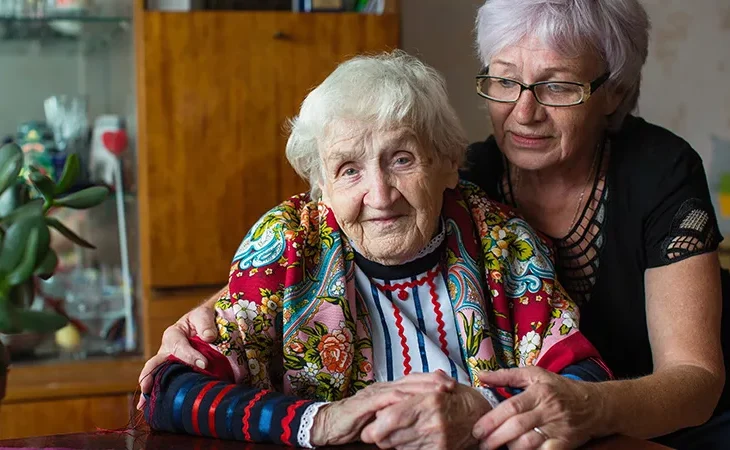Holiday gatherings bring a lot to the table, so to speak family and friends, lively conversation, food and beverage, gifts and glitter. Sometimes these gatherings also reveal changes in parents and older loved ones, especially to adult children who don’t see them as often during other times of the year or for as long.
While extended periods of time with elderly relatives or friends can clue us in that something is outside the norm for them, it’s not always easy to pinpoint exactly what. And, even if the changes are obvious, it’s even more difficult to know what to do about it.
Noticing the Signs
Let’s look at some of the things to watch for in your parents or elderly loved ones this holiday season:
- Memory impairment.
Does mom or dad show signs of unusually compromised memory? Are they confused when performing tasks that were once familiar to them? Do they get lost or seem vacant in conversations? - Changes in hygiene
Do you notice anything different in their personal care, such as grooming, dressing, odors? - Mobility problems
Are they getting around with greater difficulty or seem unsteady on their feet or upon standing? Do you notice any unusual scrapes or bruises that might indicate a recent fall? - Significant weight loss
While weight loss is not uncommon among seniors, a dramatic drop can signal a health issue, depression, diminished ability to prepare meals, or concern over food costs. - Chronic health problems
Do they complain or show signs of frequent, recurring issues such as urinary tract infections, dizziness, dehydration? These are indications that they may struggling with nutritional deficiencies or even related dementia. - Social withdrawal
Do they seem unable or unwilling to participate in conversations or uninterested in outings or activities they would normally enjoy? Hearing loss is often responsible for decreased social engagement, but depression is also a common cause. - Monetary mishaps
Are they spending unusual amounts of money or making purchases that are not typical for them? Are they vulnerable to phone or online scams? Do they have unpaid bills, bounced checks, or collection calls? - Unsafe driving
Are there unexplained dents or scratches on their car, signaling risky driving or diminished ability to properly handle a vehicle? - Poor housekeeping
Is their home uncharacteristically unkempt, or has their cleanliness in your home become an issue? Do you notice piles of laundry, dirty dishes, unmade beds, etc.? - Social miscues
Everyone has a unique personality, and what may be common for one person is outrageous for another. As an adult child, relative or friend who knows your loved one’s baseline, you are the best person to notice uncharacteristic comments or reactions from them.
Broaching the Subject
These are just some of the changes you may notice while you’re spending extended time with older friends or family. But noticing is only one part of the equation; saying something is quite another.
Having constructive conversations with your senior about your observations is paramount. But these conversations can also be very difficult. Often, older people are aware they’re experiencing changes themselves, even if they’re unwilling to acknowledge or discuss it.
Tips to consider:
- Have compassion but be honest
Such conversations with your parent or loved one are likely to be emotionally charged. As such, they must be led with compassion, patience and understanding. They should also be truthful, straightforward, and not sugar-coated. - Don’t wait
“Later…someday,” when your senior’s condition may have worsened or an emergency situation arises, is not the time to deal with any changes you’ve observed. If you’re not able to talk to your parent or loved one shortly after the holidays, as untimely as it may seem, it’s important to seize an opportunity to have a discussion while you’re still in their company. - Devise a plan
While time is of the essence, don’t improvise your approach. Rehearse or role play what you’ll say to your loved one and be ready with key points to raise and anticipation of how they’ll react and how you’ll respond. - Attend doctor visits
When possible, scheduling or going to doctor visits with your parent can be assuring to them as well as helpful in gathering and grasping information. - Involve family members
It’s important that everyone close to your loved one is on the same page. Speak with key family members about a plan of action. This is often easier when family members are together for the holidays. If possible, designate someone to be the leader of conversations and the one who ensures that talking continues. - Empower your senior
The most essential family member to include is your parent or loved one. Listen attentively to them and ask them questions about their concerns and wishes. Enable and encourage them to be an integral part of the discussion and decision process.
Seeking Help
There are multiple reputable state and national resources adult children and relatives can consult as a starting point. It’s also immensely helpful to meet face-to-face with professionals experienced in senior care and living options.
We at GreenFields of Geneva are able and willing to meet with you one-on-one to discuss the various options available to satisfy both adult children and their loved ones. Our priority is the happiness and welfare of your unique and wonderful senior. Whether you are ready to make a major living change or just need some guidance and information, we’re here to talk and to listen.



